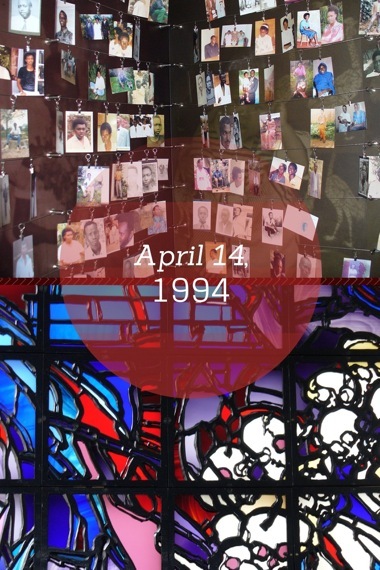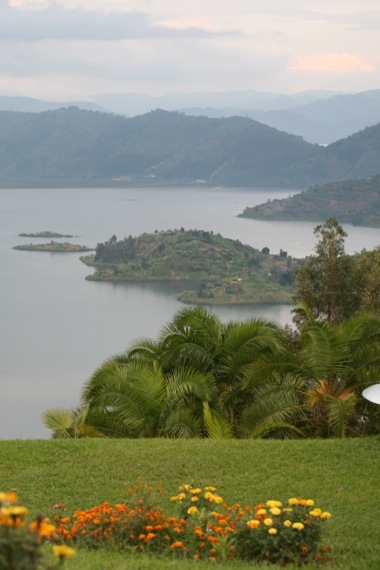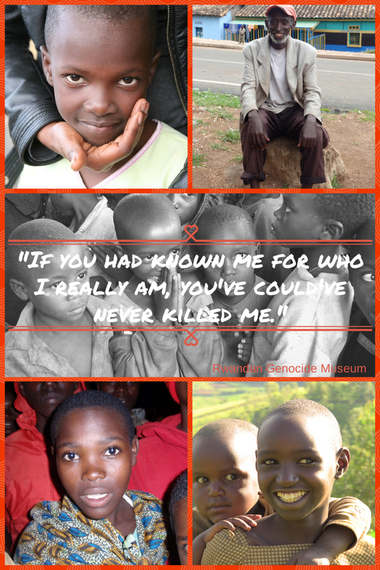There is a somber quote etched into the wall of the Kigali Memorial Centre next to photographs of slain children that reads, "If you would've known me for who I really was, you could've never killed me." The genocide memorial was dedicated in the capital city of Rwanda on the 10th anniversary of the horrific events to honor the fallen and serve as reminder to the rest of the world of the cost of hatred and ignorance. With the help of the Aegis Trust, a UK group whose mission it is to stop crimes against humanity worldwide, Kigali erected this site with the hopes that the international community would never let this happen again. I suppose it is true that "history," does indeed, "repeat itself!"
It is truly easier to turn away from the news channels and try not to think about the scores of thousands of human beings who are desperately trying to save themselves in Northern Iraq. We have all said to ourselves and others, "It's terrible, but there's no solution." "We can't fight other people's wars." "It's a no-win situation."
There is no judgment coming from this rational way of approaching this terrible situation from a military position, but what about the pure humanitarian aspect? Pause for a moment and try to imagine what the voice of a child trapped in that situation might be crying out. it's not okay to look away from this barbaric action which is undoubtedly, heading for another unacceptable genocide. Even former President Bill Clinton looked back on his handling of the situation and said, "If we'd gone in sooner, I believe we could have saved at least a third of the lives that were lost... it had an enduring impact on me." If only the efforts the world took to evacuate their embassies in Kigali had been spent trying to deter the perpetrators, we could have potentially prevented further loss of life, and saved hundreds of thousands of innocents who were being killed only for who they were.
My two visits to Rwanda in 2009 were life changing and eye opening, in spite of sharp criticism from loving family and friends, who couldn't understand why I would want to visit a site where nearly 1,000,000 people were killed in only three months, I had no explanation for my burning desire to go there once I read genocide survivor, Immaculee Ilibagiza's book, Left to Tell. In her New York Times bestselling story, she relives the dramatic tragedy of how she hid in a bathroom with seven other women for 91 days in April of 1994, only coming out to find everyone she ever knew had been slaughtered, including her own family. She made a decision to forgive the men who were stalking her outside and waiting to cut her to pieces while she was still in the bathroom hiding. Her father had taught her to love everyone no matter how they present themselves to you, because if it hadn't been for a good pastor from the other side who risked his own life to save these women, they too, would've been killed. While hiding, she could hear the French radio reports, "Don't forget the children, the child of a cockroach... is a cockroach, the child of a snake... is a snake!" Immaculee shares her story all over the world, and was truly left to tell what love and forgiveness are, as she made a decision to hold harmless the men who were trying to kill her. She had been taught to love no matter what, and she knew in her heart that her neighbors were the same as she was, and felt that many of these men were temporarily misguided and forced to participate in an evil plot to destroy her tribe.
The real history of her country is little known and even less discussed. During the end of the 19th century, there were only Rwandans. It was the European colonizers who decided to divide the race by claiming the ones who were taller, lighter-skinned, with smaller noses deserved a different classification, 'Tutsis' than the shorter, darker, wider-nosed neighbors who were coined 'Hutus.' Over 100 years, they inter-married and inter-mingled, because they knew they were really all the same race. It was a terrible tragedy inflicted upon these reverent people who were all but forced to hate each other. It was a ticking time bomb that allowed hatred to fester and would inevitably become the most catastrophic genocide in modern times. The lessons from World War II are no different, and again, it was them mindset and plan of only a small few, that mesmerized the ignorant, and was forced on so many others, which ended with millions of innocent lives. It's not okay to sit idol and let the thinking of a small minority, encourage and force armies of possibly unwilling participants, to act out their distorted plans. Meeting the people of Rwanda in person, taught me that what happened there was not caused by the people who live there. I found myself in the land of a thousand hills with the most grateful, joyful, reverent people I have ever met. It was a place so peaceful and so beautiful, I never wanted to leave. I saw only faces of joy, even from those who suffered the unspeakable tragedy. The only wish for peace and wish to serve as a reminder to all that human life is precious. If Rwandans could share a voice today for others who can't speak, they would say, "please don't leave us to die. You have the power to save us."
This is a plea to pause... just pause for a moment and imagine yourself trapped on that mountain with hunters all around wanting to kill you, like a horror movie, just sitting and not knowing when the murderers will reach you. Pause... for a moment and imagine what it would be like to be desperately trying to protect your babies from this same demise. Pause... and imagine how you would feel as you were literally choosing starvation over being chopped to pieces in front of your children. Or worse, watching your children go into their hands.
It is much easier to stay disconnected, but that won't change the fact that there are people who are fighting minute by minute to survive, and five hours from now might be too late. I recently got into a taxi cab with a man who had fled from Iraq years ago, and as his cross starting swinging back and forth from his rear-view mirror in a hypnotizing manner, he starting telling me about his childhood cathedral that had just been bombed and begged me to tell as many people as I could what was happening there. I could only think of the faces in my photographs that were taken in Rwanda, and hope that help is not too far away.



